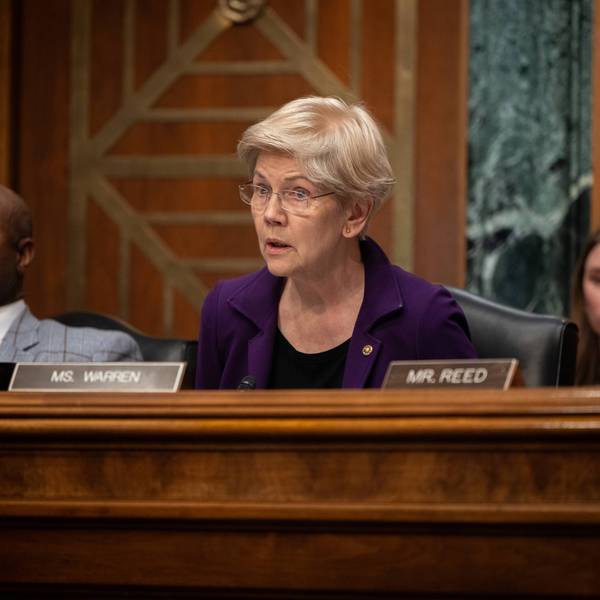U.S. Sen. Elizabeth Warren on Tuesday led calls for federal regulators to "immediately" block Capital One Financial's $35.3 billion purchase of Discover Financial Services, warning that "this Wall Street deal is dangerous and will harm working people."
The proposed all-stock deal would create the nation's sixth-largest bank by assets in a credit card industry dominated by Visa and MasterCard. Capital One CEO Richard Fairbank called the acquisition "a singular opportunity to bring together two very successful companies with complementary capabilities and franchises, and to build a payments network that can compete with the largest payments networks and payment companies."
However, Warren (D-Mass.)
warned that the proposed merger "threatens our financial stability, reduces competition, and would increase fees and credit costs for American families. Regulators must block it immediately."
The proposed acquisition comes days after the
publication of a new U.S. Consumer Financial Protection Bureau (CFPB) report revealing the "predatory" practices of credit card companies including Capital One, which charge interest rates that can exceed 30%. According to the CFPB, lack of competition "likely contributes to higher rates at the largest credit card companies."
Critics say the proposed merger will only make matters worse.
"The Capital One-Discover deal will create another colossal too-big-to-fail bank while supercharging consolidation in the credit card sector," Shahid Naeem, senior policy analyst at the American Economic Liberties Project, said in a statement. "Greenlighting the creation of the nation's sixth-largest bank and the largest credit card issuer is indefensible, particularly as the harms of bank and credit card consolidation are already causing enforcers and Congress to chart a stricter approach to both."
"It's time for bank regulators to step up and do their jobs to protect the safety and stability of the financial system, the economy, and the American consumer—starting with blocking this deal," Naeem added.
Liz Zelnick, who directs the economic security and corporate power program at the watchdog Accountable.US, said that "banking giants like Capital One have long exploited the lack of competition to price gouge families with predatory credit card interest rates and hidden junk fees."
"Even less competition under this merger means these companies will have less incentive to check their greedy practices that nickel and dime consumers into the billions of dollars," she continued. "Federal regulators should take a hard look into whether this deal runs afoul of antitrust rules at the expense of consumers."
"It's a reminder why the Biden administration's ongoing efforts to crack down on excessive and hidden junk fees from big banks are a critical step towards lowering costs for Americans," Zelnick added.
University of Michigan business law professor Jeremy Kress—a former Federal Reserve official who oversaw bank mergers—told Reuters that the deal "will provoke a significant pushback and receive heightened regulatory scrutiny."
"It will be the first big test of bank merger regulation since the Biden administration's
executive order on promoting competition in 2021," he added.




